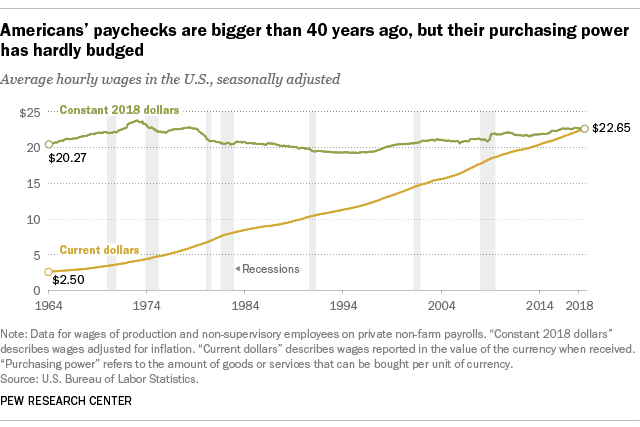Help me understand the impact of a $15 minimum wage?
Anonymous
He will support the bill, regardless of the min.age hike, and the GOP WV Gov gave him cover to do it. Bottom line, 70% of the American public want this bill passed, including 30% of republicans. So the dems are appealing directly to the American people even if the GOP in the House and Senate want to continue to be obstructionist. |
Anonymous
It's not an immediate rise, it is over several years. The Min Wage has been the same since the early 1990's. Time for it to keep pace like executive pay. |
Anonymous
Well, they are going to travel across state lines for abortions and health care as well, so... |
Anonymous
DP. The federal minimum wage in the late 80s was $3.35, not $2.25. |
Anonymous
Agree. This piece has good info on the dangers of our economic inequality. https://www.politico.com/magazine/story/2014/06/the-pitchforks-are-coming-for-us-plutocrats-108014 |
Anonymous
Exactly, 20 years ago a HOS at a DC Private made maybe 250K- 300K a year, now its 850K a year while the teachers still make the same and the custodial team not even $15/hr |
Anonymous
|
“This does not change the fact that the economic value of the carwashing labor is worth less than $15.”
Really? What would you say if I suggested that consumer prices are being subsidized by underpaid labor, and that people actually are willing and able to pay much more than they do for things? Hmmm. |
Anonymous
That's an insane wage for a private HS. $850K is more than most college presidents make operating much larger budgets. |
Anonymous
Layoffs have not occurred where this has been implemented although the argument is always that they will. Economists come out on both sides. The challenge for me is that you pay now or pay later, but you pay. Americans end up subsidizing these folks with food stamps and other government programs b/c you can't live on the current minimum wage. |
Anonymous
Not to mention that not everything is Snickers and Coke. A years worth of public college was about 800 hours of minimum wage work when that $3.35 minimum wage started, now it's about 1,300. |
Anonymous
I already pay $23 for a full service car wash, as far as I'm concerned that's too much. |
Anonymous
so wash your own car |
Anonymous
|
I’d rather we stopped this “living wage” talk and focus on making essentials like health care and housing more affordable/accessible.
If the 15 does not result in reduced employment, it will result in inflation of things like daycare, food, and housing. Then the 15 will not have as much buying power as it does now. And where does that place people who are already making 15 an hour? Are their wages going to go up too? If it does result in reduced employment, then that is going to be a larger societal problem. Work is important to human dignity and a sense of purpose. I also have kids. One will be old enough for a PT job in a year or two. Its already hard enough for young people to get their foot in the door and this will make it harder. |
Anonymous
Not raising the minimum wage hasn't stopped inflation in daycare or housing and it does mean that people making minimum wage have less buying power than they did a decade ago. Plus the history of minimum wage increases doesn't show much correlation with increased inflation, no matter what econ 101 would suggest. |
Anonymous
That’s less to do with inflation and more to do with the other factors causing college costs to rise far more than inflation. |

